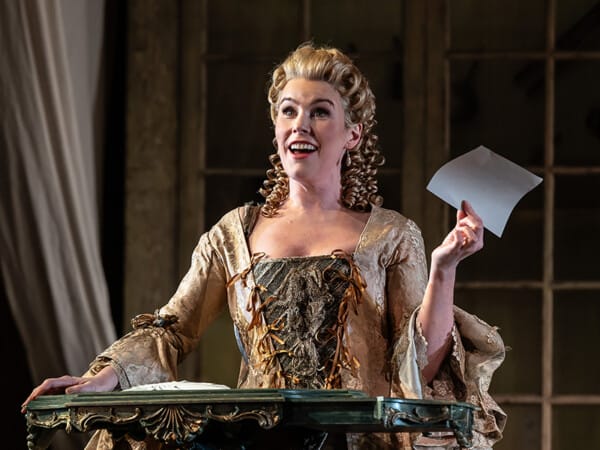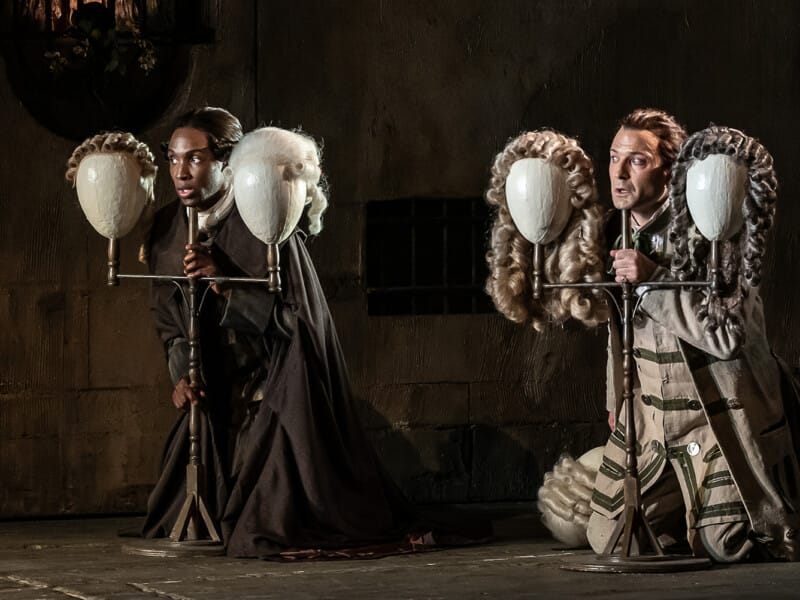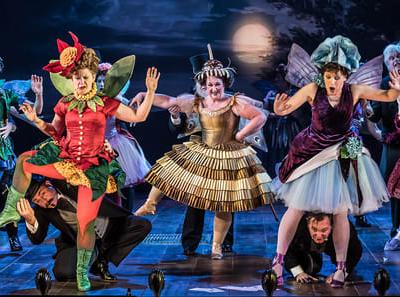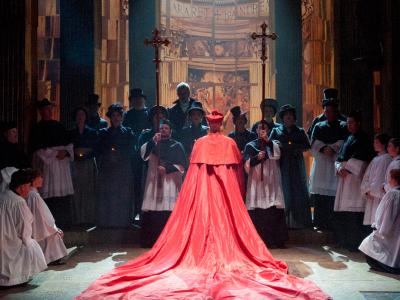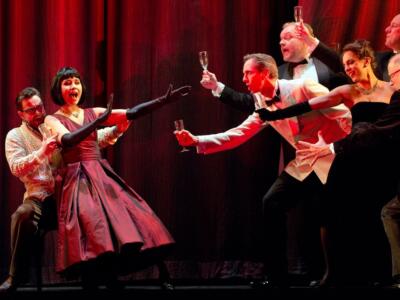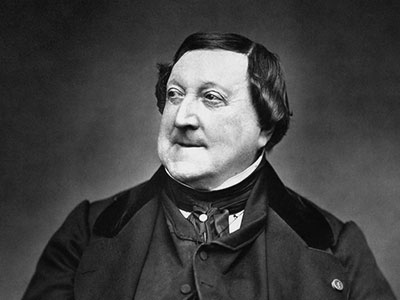
Gioachino Rossini
(born Pesaro 29 February 1792; died Passy 13 November 1868)
Gioachino Antonio Rossini was the most significant Italian composer of the first half of the nineteenth century.
Although he wrote many songs including chamber music and piano pieces, Rossini is most famous for his 39 operas, in particular his comic operas for which he set new standards of composition.
Gioachino Rossini’s most famous works include The Barber of Seville (1816), Cinderella (La Cenerentola) (1817) and William Tell (1829). Influenced by the French, he broke traditional forms of opera using unusual rhythms and bring the orchestra to the fore, however his style was tempered by changing tastes and a move away from a more formal ‘classicist’ style to Romanticism.
Discover more about the life of Gioachino Rossini, including his early influences and musical style, his prolific writing and ultimately his early retirement.
The life of Gioachino Rossini: A summary
In this section learn more about Rossini’s life, background, successful career and key accomplishments.
Early life and education
Gioachino Rossini was born in Pesaro, on the Adriatic coast of Italy in 1792. He was an only child to parents Giuseppe Rossino – a trumpeter and horn player, and Anna Guidarini, a seamstress by trade but later becoming a singer.
Giuseppe a feckless father, was imprisoned at least twice, leaving much of Gioachino’s upbringing to his mother Anna, it was when he was six that Anna embarked on a professional singing career in comic opera with some considerable success.
As a result of this, Rossini spent his entire childhood in and around the theatre with singing and playing coming naturally to him.
When the family moved to Lugo in 1802, Rossini began studying music with a local priest and was inspired by his collection of Mozart and Haydn. A quick learner, by the age of 12 Rossini had composed six sonatas and two years later he joined Bologna’s Philharmonic School and composed his first opera – Demetrio e Polibio (1806). Initially Rossini studied singing, violin, horn and harpsichord and often sung in public to earn money. However, once his voice broke Rossini gave up singing to focus on conducting and composition, supported by his parents Rossini moved to Venice which was the main operatic centre in northeastern Italy.
Career highlights
Rossini staged his first opera in 1810 to great success and financial reward and this was quickly followed by three more operas in addition to directing Haydn’s The Seasons in Bologna. In 1812, his two-act comedy La pietra del paragone ran for 53 performances at La Scala in Milan bringing him more financial benefits.
A year later, his opera seria Tancredi (1813) which was based on Voltaire’s play Tancrede performed well in Venice and following Rossini’s re-write – to give the opera a tragic ending, it went on to give him international fame in London and New York, followed in the same year by another box office success L’italiana in Algeri.
In 1815, Rossini moved to Naples, once the operatic capital of Europe, to become director of music for the royal theatres. He quickly won audiences favour and re-used a lot of his earlier work which was unfamiliar in the city.
Due to his success in Naples, Rossini was able to write more regularly, and it was during this time that he wrote some of his most famous works including; Il barbiere di siviglia – The Barber of Seville (1816) which was subsequently revived in Bologna and Otello (1816).
1817 saw him write The Thieving Magpie and Cinderella for La Scala and Rome respectively with The Thieving Magpie becoming famous for its overture and use of snare drums.
Anti-monarchy sentiment in Naples unsettled Rossini and in 1822 he travelled to Vienna with his new wife, Isabella Colbran where he was received with such enthusiasm that biographers have termed it “Rossini fever”.
London followed with a welcome from King George IV, however despite being lucrative Rossini soon returned to Paris after signing a contract with the French Embassy.
His Parisian seasons between 1823 and 1829 consolidated his achievements at home with spectacularly grand works such as Le Comte Ory (1828) and William Tell (1829).
Although Rossini’s last, William Tell is often performed and most well-known for its overture which has been used in several TV shows and films including The Lone Ranger and A Clockwork Orange.
Later life
After 39 operas in 19 years, Rossini felt with Tell he had reached not only the culmination of his career but also a natural resting point, and therefore retired from operatic composition. He did not stop composing altogether – one of the delights of his retirement years is his Petite messe solenelle, an ironic title for a sacred work that is neither small nor solemn.
Rossini’s health complications were also a factor in his choice to retire at the age of 37 as he suffered from both urethritis and arthritis as well as bouts of depression and possibly bipolar disorder.
Rossini was also profoundly affected by the death of his mother Anna, followed by the death of his father and wife, Colbran and by the 1850s his mental and physical health had significantly deteriorated.
In 1855, Rossini returned to Paris for medical care and for a time recovered well and began composing. As a man of significant wealth and fame and known for his humour he established an internally renowned salon (gathering of people by a host) and for these salons he wrote more than 150 compositions, referring to them as the ‘sins of old age’.
At the age of 76, in November 1868 Rossini died following an unsuccessful operation for colorectal cancer. His funeral service was a grand affair with more than 4000 people in attendance.
Rossini’s legacy is predominantly dominated by The Barber of Seville and William Tell, however during his lifetime he was able challenge and change the dramatic structures for serious opera as well as provide the link from opera buffa (comic opera) leading to the development of opera comique (French opera with both speech and arias).
Most recently Rossini’s music was featured in the successful animated children’s TV series, Little Einsteins, which follows the adventures of a group of children who go on missions around the world, demonstrating the enduring legacy of one of opera’s most prolific composers.
Rossini’s musical style and influence
Celebrated for his comic operas such as The Barber of Seville, which are full of music that is sensuous, brilliant and rhythmically vital, a typical example of Rossini at his best can be found in the barber Figaro’s ‘Largo al factotum’. But Rossini’s opera seria (serious operas) are equally important (though less frequently performed) and were a formative influence on Verdi in the second half of the 19th century and figures as diverse as Meyerbeer, Offenbach and even Wagner. Rossini undoubtedly transformed the form and content of Italian opera, establishing a new set of musical procedures that would invigorate and develop the genre long after he stopped composing.
Though most of Rossini’s stage works (especially the opera seria) fell out of the repertoire after his death, they were re-established in the twentieth century and occupy a key position today. Even the status of his opera seria has now been widely accepted, and performances of William Tell or The Lady of the Lake are no longer the rarities they once were.
Gioachino Rossini’s most famous operas
- Tancredi (1813)
- Il Turco in Italia [The Turk in Italia] (1814)
- Otello (1816)
- The Thieving magpie (1817)
- La Cenerentola [Cinderella] (1817)
- Mosè in Egitto [Moses in Egypt] (1818)
- La donna del lago [The Lady of the Lake] (1819), after Walter Scott
- Le Comte Ory (1828)
- Guillaume Tell [William Tell] (1829) – the final part of the overture is familiar as the theme music to the Lone Ranger television series of the 1950s and was also used in the 2012 feature movie starring Johnny Depp as the Lone Ranger’s faithful companion, Tonto.
Find out more about all ENO productions on our Discover Opera page.
Gioachino Rossini FAQs
Who is Gioachino Rossini?
Gioachino Antonio Rossini was an Italian composer who had composed 39 operas by the time his was 38. He became known as “the Italian Mozart” and two of his most famous works include The Barber of Seville and William Tell, the music from which has been used in several TV and film productions.
How do you pronounce Gioachino Rossini?
Gioachino Rossini is pronounced Jow-uh-kee-now Ruh-see-nee
What kind of music did Gioachino Rossini write?
As well as writing 39 operas, Gioachino Rossini was also known for writing chamber music, piano pieces, sacred music and instrumental compositions.
Why is Gioachino Rossini important?
Rossini was known for his comic operas, but he also challenged the format, breaking the traditional opera buffa and embellishing his melodies, ensembles and finales with unusual rhythms.
These embellished melodies meant he is deemed to be the true creator of bel canto – a style of operatic singing which translates to “beautiful singing”.
Why did Rossini stop writing operas?
Although never fully explained, Rossini retired from opera at the age of 39, he was by that point a wealthy man and internationally known. However, he also suffered from ill-health and was said to enjoy life’s luxuries so many feel he simply chose to enjoy his retirement.
How did Gioachino Rossini die?
Rossini suffered with various illnesses and depression during his life however if was following an unsuccessful operation to treat colorectal cancer that Rossini died in France in 1868.

